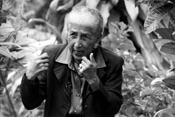 |
||||
| Still from Antonia Pantoja: Presente! (Lillian Jimenez, 2009). Used with permission from Women Make Movies. | ||||
|
||||
Journal Issue 4.1
Spring-Summer 2012
Edited by Agatha Beins, Jillian Hernandez, and Deanna Utroske
Editorial Assistant: A.J. Barks
Editorial Intern: Vera Hinsey
A Crushing Love: Chicanas, Motherhood and Activism. Directed by Sylvia Morales. New York: Women Make Movies, 2009. 58 minutes.
Antonia Pantoja: Presente! Directed by Lillian Jimenez. New York: Women Make Movies, 2009. 53 minutes.
Reviewed by Milagros Peña
The films A Crushing Love and Antonia Pantoja: Presente! capture a coming of age politically for several prominent Latina activists as well as for the U.S. Latino communities that produced them. Dolores Huerta, Elizabeth "Betita" Martinez, Alicia Escalante, Martha Cotera, and Cherrie Moraga are pillars of the Chicano, Chicana, women's, farmworkers, and Civil Rights movements of the 1960s and 1970s. A Crushing Love offers a documentary on this period and the lives of these women in their own voice. The second film, Antonia Pantoja: Presente!, documents the life and contributions of Puerto Rican activist Antonia Pantoja who founded ASPIRA (which means aspire) to address the educational disparity of New York's Puerto Rican youth and later other Latino communities. Coming of age when these women did and the family histories that moved them to a lifetime commitment to activism offers inspiring narratives. But as we learn in A Crushing Love, for their families, and their children in particular, the sacrifice of living and growing up with them was both a gift and a coming to terms with the realization that in many ways they did not only belong to them but to the world. We almost always think of these women in activist terms, but the documentary reminds us they were also mothers, daughters, and partners who often sacrificed their personal lives to serve others.
Both A Crushing Love and Antonia Pantoja: Presente! show that the 1960s and 1970s called a generation of activists to rise up and put their mark on U.S. history challenging others that have followed to dare to dream as Antonia Pantoja did through activities and organizations like ASPIRA. In the words of Digna Sánchez, ASPIRA alumnus, activist, and collaborator for the documentary, "ASPIRA opened horizons for all of us." And as Pantoja herself put it, the youth of ASPIRA "became flowers and bloomed!" Pantoja's own call to activism began when she first experienced seeing her grandfather attacked by strikebreakers in Puerto Rico and later as she would see and experience racism against Puerto Ricans in New York City. Puerto Ricans who migrated to the U.S. during the great migration (1946-1964) would work in New York City's factories in terrible conditions and their children would experience racism and be exposed to a poor public school system that resulted in high dropout rates. ASPIRA was founded to confront these schools and the high dropout rates. In other parts of the U.S., Dolores Huerta, Elizabeth "Betita" Martinez, Alicia Escalante, Martha Cotera, and Cherrie Moraga similarly answered their call to activism and service. Dolores Huerta, herself from a farmworker family, fought and continues to fight in the farmworker's movement. Elizabeth "Betita" Martinez, touched by segregation and exposure to the Civil Rights movement in D.C., answered the call to fight racism, sexism, and against injustice. Alicia Escalante's first encounter with the U.S. welfare system with her mother and the dehumanizing manner in which her mother and others were and continue to be treated became a voice for poor people's movements. Growing up in El Paso, Martha Cotera watched her family and neighbors fight racism. She remembers being inspired by the stories of women who fought with Pancho Villa in the Mexican Revolution—she wanted to be a female Pancho Villa. She would instead blaze paths for the Chicana movement as did Cherrie Moraga who was influenced by her mother's sense of education and her embrace as she came out as a lesbian. Together these activists shaped the U.S. labor, Civil Rights, welfare, Chicano, Chicana, and the larger women's movements. These women had a vision that you could organize young people and indeed they mobilized and inspired many. Their legacy has inspired generations to organize, fight racism, and engage politically.
These films reveal how drawing on the strength of family, community, and one's embrace of one's identity can be sources of empowerment even for internal community struggles. Cherrie Moraga in A Crushing Love in particular underscores how important it is to bring consciousness to the fact that to survive as a "pueblo" (Spanish for people or community) we cannot deny expression of desire and the manners in which we can as she put it "hang around to try to change it." Both films offer insights on what it means to be committed to social change and how such commitments change history. The films will be useful to those who teach race and ethnic relations, gender and women's studies, social movements, and more broadly American cultural studies.1
1 As additional resources, see: Martha Cotera, Diosa y Hembra: The History and Heritage of Chicanas in the US (Austin, TX: Austin Information Systems Development. 1976); Alma M. Garcia, Chicana Feminist Thought: The Basic Historical Writings (New York: Routledge, 1997); Virginia E. Sánchez Korrol, From Colonia to Community: The History of Puerto Ricans in New York City (Berkeley: University of California Press, 1995); Cherrie L. Moraga, Loving in the War Years: Lo Que Nunca Paso por Sus Labios (Cambridge, MA: South End Press., 2000); Vicki L. Ruiz and Virginia Sánchez Korrol, Latina Legacies: Identity, Biography, and Community (New York: Oxford University Press, 2005); Antonia Pantoja, Memoir of a Visionary: Antonia Pantoja (Houston: Arte Publico Press, 2002).
Milagros Peña is associate dean in the College of Liberal Arts and Sciences and professor of Sociology and Women's Studies at the University of Florida. Peña is the author of Latina Activists Across Borders: Grassroots Women's Organizing in Mexico and Texas published by Duke University Press in 2007.
Copyright © 2014. All rights reserved.